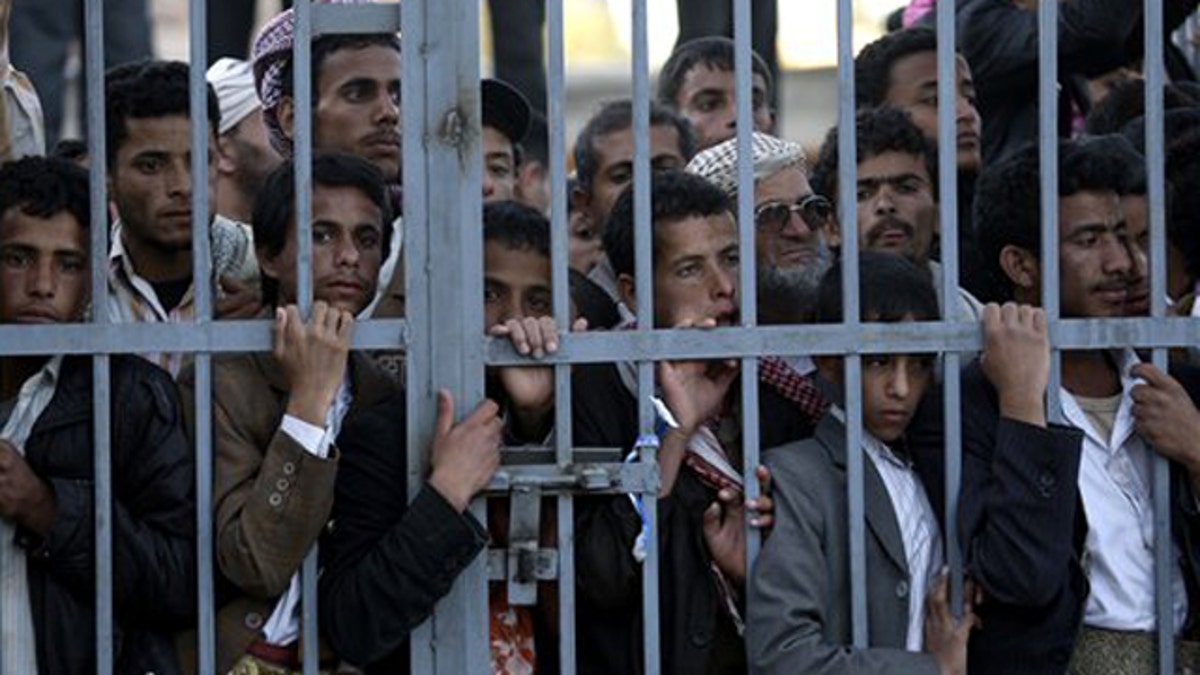
Dec. 24, 2011: Protestors stand behind the gate of a field hospital to watch wounded demonstrators being carried from the site of clashes with security forces, in Sanaa, Yemen. (AP)
SANAA, Yemen – Yemen's outgoing president said Saturday he would leave the country for the United States to help calm tensions in his country as forces commanded by his son and nephew opened fire on more than 100,000 protesters marching into the capital, killing at least eight.
The protesters had marched on foot for four days from the city of Taiz, south of Sanaa, in the first such march of its kind seen in Yemen, to pressure the government not to give Saleh immunity from prosecution. When they reached the southern entrances to the capital, forces of the elite Republican Guard fired on them with automatic weapons, tear gas and water cannons.
The turmoil reflected the confused political situation in Yemen caused by the slow-motion, uncertain exit of Saleh from power in the face of huge protests demanding his ouster that have shaken the country since February.
Late last month, Saleh signed an agreement in which he handed over his powers to his vice president and committed to step down completely in return for immunity. But opponents say he has continued to wield influence through his loyalists and relatives still in positions of power, hampering the transition ahead of presidential elections set for Feb. 21. Many feared he would find a way to continue his rule.
Saturday evening, Saleh told reporters that he would soon leave the country for the United States, though he did not specify exactly when. He had been expected to leave soon after the deal was signed -- ostensibly to undergo treatment for wounds suffered in an assassination attempt in June -- but officials say he has stalled.
"I will leave for the United States in the coming days. Not for treatment, but to get out of sight and the media to calm the atmosphere for the unity government to hold the presidential election," he said.
He said he would eventually return and pursue "political work as an opposition figure."
Government officials said ambassadors from the five permanent members of the U.N. Security Council had been in contact with Saleh the past week to pressure him to leave the country. The officials spoke on condition of anonymity because they were not authorized to talk to the press.
Saleh's exit would be a boost for Vice President Abed Rabbo Mansour Hadi, who earlier this month put together a unity government joining opposition parties with Saleh's Congress Party to try to manage the transition. However, even in Saleh's absence, his loyalists maintain their positions.
The violence around Saturday's march illustrated the limits on Hadi's control in the country. Forces loyal to Saleh have defied orders from Hadi to withdrew from the streets of Sanaa after a deadline was reached Saturday to do so.
The crowd of protesters had marched from Taiz, a city that has been a major opposition center 170 miles (270 kilometers) to the south of Sanaa. The protesters reject the deal for Saleh's removal because of the immunity provision, demanding he be tried for the deaths of protesters in his months' long crackdown on the uprising against his rule.
The marchers Saturday were trying to pass down a main avenue on which the presidential palace is located when it was met at Sanaa's southern entrance by a force from the Republican Guard, which is commanded by Saleh's son, and Central Security forces, led by Saleh's nephew, backed by tanks. Troops fired on the crowd, who responded by throwing stones.
As clashes went on, thousands of protesters camping in Sanaa's Change Square, which is the epicenter of Yemen's protest movement, marched to the scene to join in. The protesters were cordoned by security forces before reaching the site of clashes. Witnesses said they saw tanks and artillery units from military camps around the capital also heading to the site.
At least eight protesters, including a woman, were killed and more than 200 injured, including 61 wounded by gunfire, according to two doctors at a protesters' field hospital, Mohammed el-Qoutbi and Sadeq el-Shogaa.
The fighting stopped after several hours when the loyalists forces allowed the protesters to continue their march into Sanaa. Amid the clashes, Hadi issued orders for the troops to step aside, but government officials said they only obeyed after international ambassadors contacted Saleh's son Ahmed, the Republican Guard commander, and pressured him to do so.
The officials spoke on condition of anonymity because they were not authorized to discuss the behind-the-scenes efforts.
The march came as Yemen's parliament convened Saturday for the first time since opposition and independent lawmakers suspended their participation in March to protest the crackdown against protesters.
Lawmakers were to discuss the program of the new national unity government, headed by veteran independent politician Mohammed Basindwa.
On Dec. 7, Basindwa said the government will focus on providing public services to the people, including electricity, water, fuel and basic commodities together with restoring security and stability.
